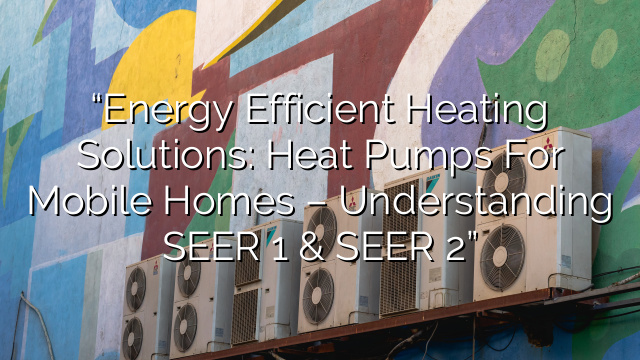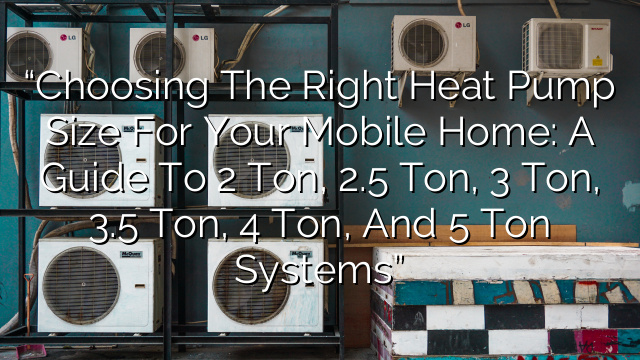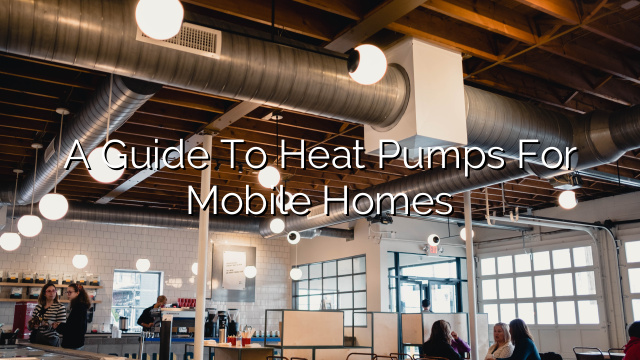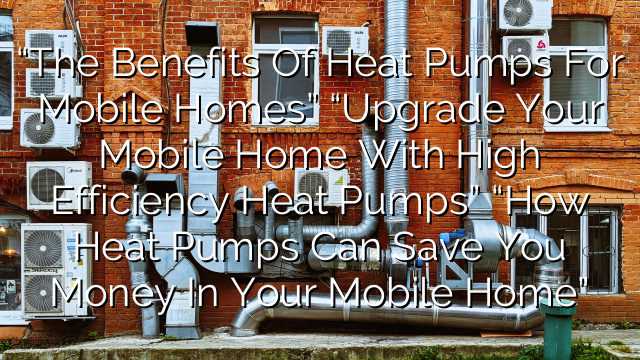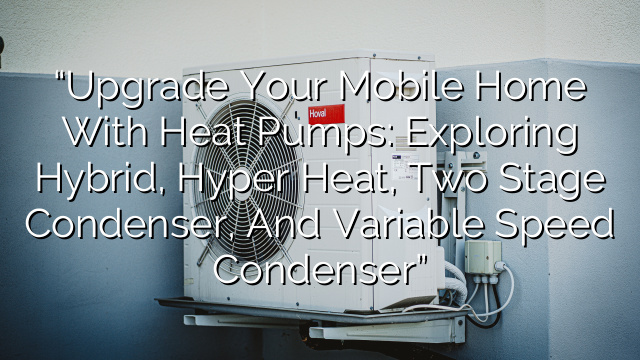Introduction
Mobile homes can be a cost-effective and convenient housing option for many people. However, one challenge faced by mobile homeowners is finding energy-efficient heating solutions. Heat pumps can be a great option for mobile homes as they provide both heating and cooling functions. In this blog post, we will explore the importance of SEER ratings when choosing a heat pump for your mobile home.
Understanding SEER Ratings
SEER stands for Seasonal Energy Efficiency Ratio, which measures the efficiency of an air conditioner or heat pump. The higher the SEER rating, the more efficient the unit is. In the United States, the minimum SEER requirement for manufactured homes is typically 13.
The Difference Between SEER 1 and SEER 2
When it comes to heat pumps for mobile homes, there are two types of SEER ratings to consider: SEER 1 and SEER 2. SEER 1 is the cooling efficiency rating, while SEER 2 is the heating efficiency rating. It is important to understand both ratings when choosing a heat pump for your mobile home to ensure you have an energy-efficient and cost-effective heating solution.
The Importance of SEER Ratings for Mobile Homes
Choosing a heat pump with a high SEER rating is crucial for mobile homeowners looking to reduce their energy consumption and save money on their utility bills. Mobile homes typically have limited space and insulation compared to traditional houses, making energy efficiency even more important. A heat pump with a high SEER rating can provide efficient heating and cooling without compromising comfort or increasing energy costs.
Benefits of High SEER Rated Heat Pumps
Investing in a high SEER rated heat pump for your mobile home can provide several benefits, including:
- Energy Savings: High SEER rated heat pumps use less energy to produce the same amount of heating or cooling compared to lower SEER rated models. This can result in significant energy savings over time.
- Cost Savings: By reducing energy consumption, high SEER rated heat pumps can help lower monthly utility bills, saving you money in the long run.
- Environmental Friendliness: Heat pumps with higher SEER ratings have a smaller carbon footprint, as they require less energy to operate. By choosing an energy-efficient heat pump, you are reducing your impact on the environment.
- Improved Comfort: High SEER rated heat pumps provide consistent heating and cooling, ensuring a comfortable indoor environment no matter the weather outside.
Choosing the Right SEER Rated Heat Pump for Your Mobile Home
When selecting a heat pump for your mobile home, it’s important to consider your specific needs and budget. A higher SEER rated heat pump may have a higher upfront cost but can provide greater long-term savings through energy efficiency. However, it’s crucial to find the right balance between cost and efficiency to ensure you get the best value for your investment.
Additionally, consider factors such as the size of your mobile home and your climate zone. Homes in colder climates may require a higher SEER rated heat pump to ensure effective and efficient heating during winter months.
FAQs
Q: Are heat pumps suitable for all mobile homes?
A: Heat pumps can be suitable for most mobile homes. However, it is important to consider factors such as the size of your mobile home and your climate zone when choosing a heat pump for your specific needs.
Q: Can heat pumps be used for both heating and cooling?
A: Yes, heat pumps are designed to provide both heating and cooling functions. They operate by transferring heat between the indoors and outdoors, providing efficient temperature control throughout the year.
Q: How often should I replace my heat pump?
A: The lifespan of a heat pump can vary depending on usage and maintenance. However, on average, heat pumps can last between 10 to 15 years. Regular maintenance and servicing can help extend the lifespan of your heat pump.
Q: Can I install a heat pump myself?
A: While it is possible to install a heat pump yourself, it is recommended to hire a professional HVAC technician for installation. Installing a heat pump involves complex electrical and refrigerant work that should be done by a qualified professional to ensure safety and optimal performance.
Q: What is the Energy Star certification?
A: The Energy Star certification is an internationally recognized symbol of energy efficiency. Energy Star certified products, including heat pumps, meet strict energy efficiency guidelines set by the U.S. Environmental Protection Agency (EPA). Choosing an Energy Star certified heat pump ensures that you are investing in an energy-efficient and environmentally friendly heating solution.
Q: Are there any incentives or rebates available for purchasing an energy-efficient heat pump?
A: Some local utility companies and government agencies offer incentives or rebates for purchasing energy-efficient appliances, including heat pumps. Check with your local utility company or visit the Energy Star website to see if there are any available incentives or tax credits in your area.
Q: Can I use my existing ductwork with a heat pump?
A: In most cases, existing ductwork can be used with a heat pump. However, it is recommended to have a professional HVAC technician inspect and evaluate your ductwork to ensure it is compatible with a heat pump and properly sealed for optimal efficiency.
Q: What is the cost of installing a heat pump for a mobile home?
A: The cost of installing a heat pump for a mobile home can vary depending on factors such as the size of the home, the type of heat pump, and the complexity of the installation. It is best to obtain quotes from reputable HVAC contractors to get an accurate estimate for your specific project.
Q: How often should I service my heat pump?
A: It is recommended to service your heat pump annually to ensure optimal performance and efficiency. Regular maintenance, such as cleaning filters, lubricating moving parts, and checking refrigerant levels, can help extend the lifespan of your heat pump and prevent unexpected breakdowns.
Q: Can I use a heat pump in extremely cold climates?
A: Heat pumps can be used in colder climates; however, they may require additional supplemental heating during extremely cold weather. It is important to choose a heat pump that is suitable for your climate zone and consult with an HVAC professional to determine if supplemental heating is needed for your specific area.
In conclusion, heat pumps offer an energy-efficient heating solution for mobile homes. Understanding SEER ratings, such as SEER 1 and SEER 2, is essential when choosing the right heat pump for your mobile home. By selecting a heat pump with a high SEER rating, you can enjoy energy savings, cost savings, and improved comfort while reducing your environmental impact. Remember to consult with a professional HVAC technician to ensure you choose the most suitable heat pump for your specific needs and receive proper installation and maintenance.

